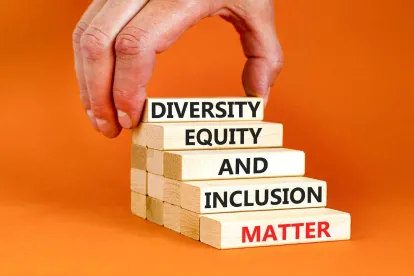The Supreme Court of the United States’ recent decision to strike down affirmative action admissions policies in higher education is having significant indirect consequences for private employers and their diversity, equity, and inclusion (DEI) efforts.
Quick Hits
-
The Supreme Court’s affirmative action decisions and shifting public perceptions could lead to increased scrutiny of private employers’ DEI initiatives, voluntary affirmative action programs, and ESG efforts.
-
Private employers may need to focus on aspects of diversity beyond race and may alternatively need to focus on inclusivity.
On June 29, 2023, the Supreme Court ruled that race-conscious college admissions policies at two universities aimed at maintaining racially diverse student bodies violated the Equal Protection Clause of the Fourteenth Amendment, which broadly prohibits discrimination based on race.
While the decisions will directly affect admissions policies at higher education institutions across the country, private employer DEI policies and initiatives, voluntary affirmative action programs, and environmental, social, and governance (ESG) efforts will also likely face greater scrutiny and legal challenges and employers may need to adapt to this quickly evolving legal landscape.
Increase in Legal Challenges
Employers are prohibited from discriminating based on race and several other protected characteristics under a variety of state and federal laws, notably Title VII of the Civil Rights Act of 1964. Traditionally, employers have been concerned with discrimination against those in racial or ethnic minorities and have sought to foster diversity in their workplaces through a variety of efforts often labeled as voluntary affirmative action and DEI,.
However, the Supreme Court’s recent affirmative action decision reframes the issues and calls into question the lawfulness of race-conscious considerations, regardless of purpose. While Chief Justice John Roberts characterized the diversity goals in educational settings as “commendable” in his majority opinion, he stated that “[r]acial classifications are simply too pernicious to permit.”
In a concurring opinion, Justice Neil Gorsuch stated that Title VI, which applies to institutions that receive federal funding, prohibits universities from “treating any individual worse even in part because of his race, color, or national origin and without regard to any other reason or motive the recipient might assert.” Justice Gorsuch connected Title VI to Title VII, stating that together the laws “codify a categorical rule of individual equality, without regard to race.”
This rejection of the consideration of race even if to ensure diversity seemingly applies beyond the educational context. It is likely that private employer DEI and ESG programs as well as voluntary affirmative action programs will face an increase in so-called reverse discrimination claims from individuals (or advocacy organizations on their behalf) in groups not directly targeted by such opportunities. Obligations of covered federal contractors subject to the affirmative action regulations should not be affected by the decision, even though their DEI efforts could face increased scrutiny.
Evolving Legal Landscape
The Supreme Court’s decision may influence broader public perception around diversity and alter societal expectations regarding affirmative action, and employers may face pressure both internally and externally to modify DEI policies. In addition to legal claims, employer DEI efforts will likely face increased scrutiny from state and federal agencies that enforce antidiscrimination laws and from lawmakers in some states who are already skeptical of DEI efforts and who may act to ban or curtail such efforts by private employers.
Within weeks of the ruling, attorneys general from thirteen states sent a joint letter, dated July 13, 2023, to the largest companies in the United States warning them that race-based preferences “whether under the label of ‘diversity, equity, and inclusion’ or otherwise,” may violate federal and state antidiscrimination laws. The state attorneys general urged companies to “immediately cease any unlawful race-based quotas or preferences” or be “held accountable—sooner rather than later—for your decision to continue treating people differently because of the color of their skin.”
The letter highlights how some state enforcement agencies are interpreting the college affirmative action decisions as empowering them to shut down DEI and diversity efforts across society. But not all agree. Just days later a separate group of state attorneys general responded with their own letter to “reassure” companies that “corporate efforts to recruit diverse workforces and create inclusive work environments are legal and reduce corporate risk for claims of discrimination.”
Meanwhile, the U.S. Equal Employment Opportunity Commission (EEOC), a federal agency tasked with enforcing Title VII employment discrimination requirements, called the affirmative action ruling a “problem” and stated “[d]iversity helps companies attract top talent, sparks innovation, improves employee satisfaction, and enables companies to better serve their customers.”
In the educational context, the U.S. Department of Education, in July 2023, opened a formal investigation into some donor and so-called legacy-admissions policies stemming from complaints that such policies, which give preferences or advantages to applicants who have had family attend a school or who make financial donations, violate Title VI’s prohibition on racial discrimination.
Future of Workplace Diversity Efforts
Employers will face internal and external pressure to reevaluate their voluntary affirmative action programs, as well as DEI and ESG efforts to focus beyond race-conscious considerations and some are already amending or doing away with their programs in light of the new legal risk.
Still, the ruling does not mean employers must do away with voluntary affirmative action, DEI, and ESG initiatives and programs entirely, but employers may want to evaluate the impetus for these efforts to ensure the appropriate legal framework is applied when assessing risk. Also, employers may want to evaluate specific programs to the extent that they are focused solely on race or ethnicity.
Specifically, initiatives, policies, or programs that tend to implicate employment actions may face harsher scrutiny and could be more likely to be found to be unlawful. These may include programs that:
-
require diverse interview slates,
-
limit opportunities to specific underrepresented groups (including internships or scholarships for a specific race/ethnicity or gender group, leadership development programs, talent development programs, and mentorship initiatives),
-
set goals and timelines for representation within specific roles,
-
incentivize decision-makers to base decisions on affirmative action or DEI results, or
-
require diversity on boards of directors.
Alternatively, private employers that seek to maintain diverse and equitable workplaces may want to consider doing so through more comprehensive diversity strategies to achieve their goals. Strategies that focus on aspects of diversity beyond race, such as socioeconomic background, education, gender, disability, or other underrepresented identities, may better withstand scrutiny.
Furthermore, a focus on inclusion, rather than diversity, may be key for employers moving forward. The concept of inclusivity encompasses programs designed to create an environment where individuals from diverse backgrounds feel welcome, respected, valued, and supported, such as nonexclusionary and well-defined employee resource groups.
Key Takeaways
Regardless of the Supreme Court’s decision, employers are expected to continue to prioritize maintaining diversity in their workplaces. While the Supreme Court’s recent decision focuses on affirmative action in the context of higher education, it will influence broader discussions and could pave the way for a shift in how private employers approach and prioritize diversity and inclusion within their organizations.
As such, employers may want to consider:
-
Reviewing their existing DEI and ESG commitments, policies, and public statements
-
Evaluating voluntary affirmative action programs and DEI programs and initiatives for compliance with existing antidiscrimination laws in alignment with business goals and risk profiles
-
Noting the quickly evolving legal landscape of cases, state laws, and actions by state and federal antidiscrimination regulators, and activist shareholders
Ogletree Deakins will continue to monitor developments and will provide updates on the Affirmative Action / OFCCP, Diversity and Inclusion, and Employment Law blogs.






 />i
/>i

